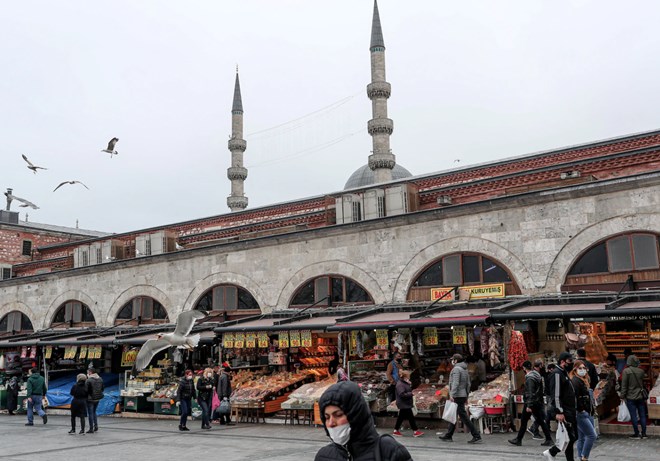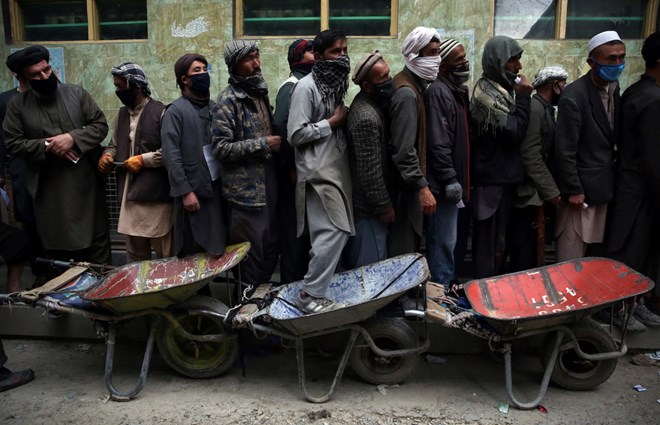Iranian President Hassan Rouhani was practically apologetic as he asked Iranians on Sunday not to visit holy shrines during Ramadan or participate in iftar gatherings, the festive evening meals.
“In the holy month of Ramadan, we won’t have the usual ceremonies, like iftar,” Rouhani told the nation’s coronavirus task force, his comments later released publicly. Holy shrines and mosques, he said, “will be closed for another two weeks pending new meetings.”
But clerics claiming the mantle of righteousness have in some places challenged the official prohibitions.
In Pakistan, where the government ruled that only groups of five or less could attend prayers at mosques, security forces broke up a handful of large prayer gatherings, igniting clashes between worshipers and police. And the country’s religious establishment has pushed back against the restrictions, with a group of 50 prominent clerics issuing warning to the government last week to ease them and stop the arrests.
On Saturday, the government gave in and dropped the limits on mosque attendance. “The people want to see their political and religious leaders on the same page and any conflict would be counterproductive,” President Arif Alvi told reporters Saturday, according to local Pakistani news outlet Geo News.
From Egypt to Malaysia and beyond, the coronavirus has cast a long shadow over the world’s 1.8 billion Muslims as they prepare for the holiest month of the year.
In many countries, authorities have enacted comprehensive lockdowns, imposed curfews and ordered travel bans in addition to suspending mosque prayers and banning other religious gatherings.
The strict measures, combined with closures of borders and airports, have hit the poor especially hard as unemployment soars and food prices spike just as Ramadan starts.

People shop for Ramadan in Istanbul on Monday. (Sedat Suna/EPA-EFE/Shutterstock)
Over the weekend, Egyptian religious authorities urged that any charity be given to the poor before Ramadan starts because the traditional charity tables will be barred. Also banned is the Itikaf ritual in which Muslims spend the last 10 days of Ramadan in mosques to pray and meditate. Egypt’s mosques have been shuttered since last month to prevent the spread of the virus.
Saudi Arabia has said it is suspending visas for Muslims seeking to make pilgrimages to the holy cities of Mecca and Medina, popular during the month of Ramadan. The Prophet’s Mosque in Medina also announced last week it was also banning events to dispense evening meals to the poor to break their fast.
“This year, Ramadan will be different,” said Gehad Soliman, 27, an engineer in Cairo. “And there is nothing we can do about it.”
Soliman said she would choose a place in her house to perform the Ramadan rituals. Forgoing the iftar gatherings would be “truly painful” because most of her family will not be able to come over.
“We are a very close family, we gather all the time,” she said. “But now we keep on telling each other that we cannot meet anymore for the sake of our health. We are doing this to protect our loved ones more than ourselves.”
Pakistani Prime Minister Imran Khan has been reluctant to order a blanket shutdown for fear the measures will damage the already struggling economy. Instead, local governments have issued their own restrictions, closing most businesses across the country and ordering people to remain in their homes.
The prominent Pakistani newspaper Dawn voiced support for the government restrictions in an editorial. “This should not be seen as an affront to religion; rather, it is an attempt to save the lives of the general public,” the editors wrote.
But clerics have criticized the approach, claiming the measures disproportionately hurt the country’s poor and devout. And many devout Pakistanis believe congregational prayer is necessary for the country to defeat the coronavirus.
“We have to return to Allah to pray for ending this coronavirus,” said Maulana Hamid ul-Haq, the son of slain Pakistani cleric Maulana Sami ul-Haq and deputy head of a religious seminary that historically had links to the Taliban.
While the closure of schools, public transit and most businesses has been extended into Ramadan, the government announced mosques will be opened to large groups for worship during the holy month.
In northwestern Syria, where the extremist Hayat Tahrir al-Sham rebel group, or HTS, holds sway, the local Islamist government announced earlier this month that Friday prayers would be paused for two weeks to protect residents from the spread of the virus.
The next day, defying the order, a previous HTS commander held Friday prayers in a mosque in Idlib, according to a Telegram channel that reports his news.
In Afghanistan, aid groups and religious organizations have reported a surge in people requesting food assistance ahead of Ramadan. Coronavirus-related lockdown measures in cities across the country, restrictions on domestic movement and the closure of international borders have driven food stocks down and unemployment up.

Workers in Kabul wait in line Monday to receive wheat donated by Afghan business executives. (Rahmat Gul/AP)
Abdul Fatah Jawad, a member of Jamiat Eslah, an Islamist group with a large charity wing, said requests have skyrocketed and are outpacing donations. “People are calling, texting and some show up in person, crying and begging for donations,” he said. “Some families do not have food even for a week. The situation is extremely critical.”
Jawad said his organization usually donates about $75,000 to the poor in the lead-up to Ramadan but this year has already distributed more than $100,000, and the holy month has not yet begun.
In Yemen, too, there is growing concern among the poor.
Sameer Ahmed Alharbi, 32, a university student and father of two in the central province of Marib, said food prices have increased dramatically. People, he said, are not prepared for Ramadan or the coronavirus. Last week, Yemen saw its first confirmed case of the virus.
“Ramadan is approaching, and we haven’t been able to buy enough food,” Alharbi said. “Now with the threat of this disease, if it spreads in our country, it will be catastrophic.”
Mosques, he said, are open, as are markets. “We haven’t seen any precautionary measures taken by the local authorities in this regard,” he said. “The local authorities announced a curfew three days ago from 9 p.m. to 9 a.m., but people have not adhered to it. People are very reckless.”